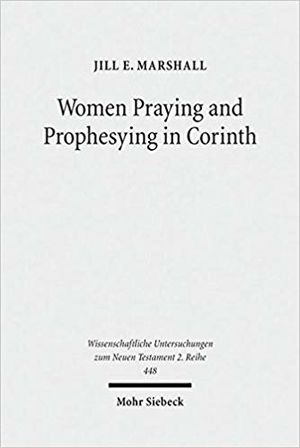Women Praying and Prophesying in Corinth: Gender and Inspired Speech in First Corinthians (2017 Marshall), book
Women Praying and Prophesying in Corinth: Gender and Inspired Speech in First Corinthians (2017) is a volume edited by Jill E. Marshall.
Abstract
"In First Corinthians, Paul makes two conflicting statements about women's speech: He crafts a difficult argument about whether men and women should cover their heads while praying or prophesying (11:2-16) and instructs women to be silent in the assembly (14:34-35). These two statements bracket an extended discussion about inspired modes of speech - prophecy and prayer in tongues. From these exegetical observations, Jill E. Marshall argues that gender is a central issue throughout 1 Corinthians 11-14 and the religious speaking practices that prompted Paul's response. She situates Paul's arguments about prayer and prophecy within their ancient Mediterranean cultural context, using literary and archaeological evidence, and examines the differences in how ancient writers described prophetic speech when voiced by a man or a woman."--Publisher description.
Editions
Published in Tübingen : Mohr Siebeck, 2017.
Contents
Preface -- List of abbreviations -- Introduction -- From "women praying or prophesying" to "let women be silent" -- Project plan -- Interpreting women's speech in corinth : rhetoric and historical reconstruction -- Reading 1 corinthians and reconstructing the corinthian situation -- Ferdinand christian baur's corinthian factions -- Sources of problems : gnosticism, realized eschatology, Paul's teachings -- The sociological turn : theissen, meeks, and schussler fiorenza -- Women in the corinthian assembly -- Men and women in worship and the galatians 3:28 connection -- Elisabeth schussler fiorenza and Paul's ambivalent impact for women -- Antoinette clark wire's corinthian women prophets -- Jorunn Okland and the discourse of gender and sanctuary space -- Defining prophecy and prayer in tongues -- Origins and backgrounds for prophecy and tongues -- Form and content of prophecy and tongues -- The question of mental states and ecstasy -- Paul's rhetorical goals in defining inspired speech -- Women prophets in ancient mediterranean divination -- Cataloging and defining divination -- The anthropological turn : jean-pierre vernant and followers -- Gender dynamics in oracular institutions -- Summary of research and questions remaining -- Women praying and prophesying : archaeological evidence from corinth -- Introducing corinth -- History and archaeology -- Temples and religious spaces in roman corinth -- Women's presence in the roman forum : inscriptions -- Women praying : devotion to demeter and isis -- The sanctuary of demeter in the roman period -- Earliest use : curse tablets on the lower terrace -- Temple construction in the late first century -- Sanctuaries for isis in corinth and kenchreai -- Literary evidence : pausanias and apuleius -- Archaeological evidence -- Apuleius's isis festival in kenchreai (metamorphoses, book Xi) -- Women prophesying : corinth and oracular temples of apollo -- Connections to trans-regional oracles -- Apollo temples and images in corinth -- Conclusion -- Ambivalence toward women's speech : livy, philo, and plutarch -- Livy's history : roman matrons speaking in the forum -- Philo of Alexandria : women and the female part of the soul -- Philo's gender dualism -- De specialibus legibus 3.169-80 : spaces for women's speech -- De vita contemplativa : men, women, and ecstatic speech -- Plutarch : virtue and speech in state and household -- Women's form, fame, and speech in virtues of women -- Women inside and outside of the home in conjugalia praecepta -- Conclusion -- Women prophets in philosophical, poetic, and oracular literature -- Philosophical traditions -- History and philosophy : interrogating communication with gods -- Herodotus's history! -- Plato's three forms of madness -- The pythia in plutarch's de defectu oracularum and de pythiae oraculis -- Poetic traditions -- Poetry : dramatizing communication with gods -- Athenian drama -- Latin epic poetry -- The sacrifice of the pythia in lucan's de hello civili -- Oracular traditions -- Prophecy : recording communication with gods -- Male and female prophets in the Hebrew Bible -- Sibylline collections in Greek and Roman traditions -- The sibyl's embodiment of apocalyptic prophecy in the sibylline oracles -- Conclusion -- Women praying or prophesying : the ambivalent argument of 1 corinthians 11 : 2-16 -- The structure and difficulties of 1 corinthians 11 : 2-16 -- The situation : keeping traditions, praying, and prophesying (11:2) -- Theological premise : heads and bodies (11:3) -- Cultural norms of gender differentiation (11:4-6) -- Creation narratives and gender identity (11: 7-12) -- More cultural arguments : propriety, nature, and custom (11:13-16) -- Conclusion -- Voiceless idols, voiceless women : the argument from 1 corinthians 11:16 to 14:40 -- Argumentative movements in 11:17-14:25 -- The ritual meal in assembly : 1 corinthians 11:17-34 -- Voiceless idols, one speaking spirit : 1 corinthians 12:1-11 -- The body of christ : 1 corinthians 12:12-31 -- A better way : 1 corinthians 13:1-13 -- Defining prophecy and praying in tongues : 1 corinthians 14:1-25 -- Pursue prophecy in order to build up (14:1-5) -- The limited efficacy of speaking in tongues (14:6-12) -- Mindlessness of speaking in tongues (14:13-19) -- Responses of outsiders to inspired speech (14:20-25) -- Instructions for order for praying or prophesying (14:26-40) -- The textual integrity of 14:34-35 -- The rhetorical integrity of 14:26-40 -- Conclusion -- The gender dynamics of inspired speech -- Implications of this research -- Bibliography -- Index of ancient sources -- Subject index.
